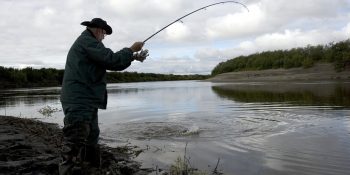DENVER – The Colorado Parks and Wildlife Commission recently adopted a rule change, requiring all visitors 18 or older to possess a valid hunting or fishing license to access any State Wildlife Area or State Trust Land leased by Colorado Parks and Wildlife. This new rule will be in effect beginning July 1, 2020.
“Colorado Parks and Wildlife manages over 350 State Wildlife Areas and holds leases on nearly 240 State Trust Lands in Colorado, which are funded through the purchase of hunting and fishing licenses,” said Southeast Regional Manager Brett Ackerman. “The purpose of these properties is to conserve and improve wildlife habitat, and provide access to wildlife-related recreation like hunting and fishing that are a deep part of Colorado’s conservation legacy.”
Because these properties have always been open to the public, not just to the hunters and anglers that purchased them and pay for their maintenance, many people visit these properties and use them as they would any other public land. As Colorado’s population – and desire for outdoor recreation – has continued to grow, a significant increase in traffic to these SWAs and STLs has disrupted wildlife, the habitat the areas were acquired to protect, and the hunters and anglers whose contributions were critical to acquiring these properties.
Because funding for these properties is specifically generated by hunting and fishing license sales and the resulting federal match, requested options such as “hiking licenses” or “conservation permits” would not allow for the maintenance and management needed. Any funding from one of these conceptual licenses or permits would reduce the federal grant dollar for dollar and thus fail to increase CPW’s ability to protect and manage the properties.
“This new rule change will help our agency begin to address some of the unintended uses we’re seeing at many of our State Wildlife Areas and State Trust Lands,” said CPW Director Dan Prenzlow. “We have seen so much more non-wildlife related use of these properties that we need to bring it back to the intended use – conservation and protection of wildlife and their habitat.”
“We do anticipate some confusion based on how the properties are funded, and the high amount of unintended use over time in these areas. We plan to spend a good amount of time educating the public on this change,” said Ackerman. “But in its simplest form, it is just as any other user-funded access works. You cannot use a fishing license to enter a state park, because the park is not purchased and developed specifically for fishing. Similarly, you cannot use a park pass to enter lands that are intended for the sole purpose of wildlife conservation, because a park pass is designed to pay for parks.” State law requires that the agency keep these funding sources separated.
CPW is a user-funded agency and, unlike most government agencies, receives very little money from the general fund. The new rule requires all users to contribute to the source of funding that makes the acquisition and maintenance of these properties possible. But the activities that interfere with wildlife-related uses or that negatively impact wildlife habitat don’t become acceptable just because an individual possesses a hunting or fishing license. Each SWA and STL is unique and only certain activities are compatible with each property.
Many questions on the new rule are answered through our State Wildlife Area Frequently Asked Questions document. Visit cpw.state.co.us for additional information on agency projects and funding.
photo credit: MGN
SPREAD THE NEWS
COMMENT, Like, Follow & SHARE @I70Scout
CURRENT EDITION
WEATHER & TRAFFIC PUZZLES RECENT NEWS ADVERTISE WITH US
